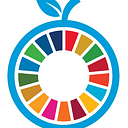A clarion call for food systems transformation
By Michael Quinn Patton, Blue Marble Evaluation Network
More than 40,000 people from around the world participated in 850 Independent Dialogues in support of the Food Systems Summit being convened on September 23 by the United Nations.
The major themes that emerged from those Dialogues have now been published in a Synthesis Report available here. Dialogue participants provided guidance on what is needed and envisioned to transform food systems. Transformation means major, significant, deep, and broad changes beyond piecemeal reforms, incremental change, and narrowly focused projects and programs. Participants spotlighted the importance of ensuring sustainability and strengthening resilience. Sustainability entails humanity and nature thriving together, with resilience as the capacity to regenerate and adapt. Resilience supports sustainability.
Here are highlights of other major guiding themes from the Dialogues:
· Make equity a priority. Dialogue participants emphasized contributions to equity as a priority criterion for judging food systems solutions.
· Treat everyone as a stakeholder in food systems. The call is for everyone to be involved; all hands on deck.
· Value diversity & engage inclusively. An extension of treating everyone as a stakeholder is valuing diversity and engaging inclusively which are essential to achieve equity.
Dialogue participants emphasized that UN member-state governments will need to be at the forefront in supporting and driving transformation but that all sectors and stakeholders will need to work together with governments toward food system transformation. This will require creating transformative partnerships, synergies, and alliances supported by multistakeholder
platforms and networks. Power imbalances will have to be acknowledged and managed.
Another major theme was the need to amplify and empower historically excluded voices. Dialogues spotlighted women, Indigenous Peoples, youth, and smallholder farmers and other small-scale producers as needing and deserving special attention and engagement.
Dialogues also provided guidance on transformation processes:
· Apply systems thinking. The food systems summit has elevated and focused attention on food systems.
· Recognize complexity. Complexity is recognized as a fundamental food systems summit principle of engagement.
· Guarantee the right to food. Dialogues emphasized that conceptualizing food as a right, rather than merely a market-based commodity, would provide a unified and universal framework for food systems transformation.
· Contextualize and localize. Dialogue participants consistently emphasized localized food systems, in which different solutions will be needed for different contexts through place-based innovation and adaptation.
· Innovate and integrate what is already working. Change what needs to be changed, innovate, and adapt but also identify, keep, and build on what is working.
Many Dialogues discussed and supported “nature-positive solutions.” Nature-positive means going beyond reducing damage to food ecosystems and, instead, making ecosystems thriving and resilient. this includes several sustainable approaches to agricultural production and human consumption of food: agroecology, regenerative agriculture, and organic farming, among other related approaches.
For transformation to occur, Dialogues identified success factors that are key to transformative results. There will have to be education about food systems transformation to assist in shifting perspectives and revising problematic narratives. Massive financial investments will be needed to transform food systems. But also, how investments are made needs transformation: cost of loans, access to finance, and funding policies that support food systems transformation. It will be critical to align and integrate coalitions and solutions. It will also be critical to facilitate conflict resolution and negotiate trade-offs so that disagreements do not become bottlenecks that stop the transition to more sustainable and equitable systems
Dialogues emphasized the importance of ensuring openness and transparency. Transparency emerged as a major and consistent concern across dialogues that applies to all aspects of food systems transformation decision-making and implementation.
Finally, Dialogue participants called for all involved to act with urgency and to learn and adapt through ongoing evaluation.
While the focus of the Dialogues was on transforming food systems, participants recognized that climate change and the pandemic have had and are having major effects on food and agriculture.
Therefore, it is essential to build global transformation momentum across systems because the potential for food systems transformation was inevitably and intrinsically tied to transformation of climate and health systems.
The Guiding Themes are not a mere checklist of items to address one by one. Dialogue participants cautioned that isolated and siloed solutions will not achieve transformational impacts. No singular solutions are likely to be sufficiently powerful to reach the critical mass that can tip systems into new, more equitable and sustainable trajectories. Thus, solutions need to be examined for their cumulative, interactive, and interdependent interconnections that, implemented together in mutually reinforcing momentum, can transform food systems. The Dialogues have emerged as providing important and thoughtful guidance about how food systems transformation should be undertaken, and solutions implemented. Below, the guiding themes are presented woven together as a potential framework for a theory of transformation, which has emerged from the synthesis of 443 Dialogue Feedback reports.
The views and opinions expressed in this blog are those of the authors and do not necessarily reflect the official policy or position of the United Nations Food Systems Summit.
